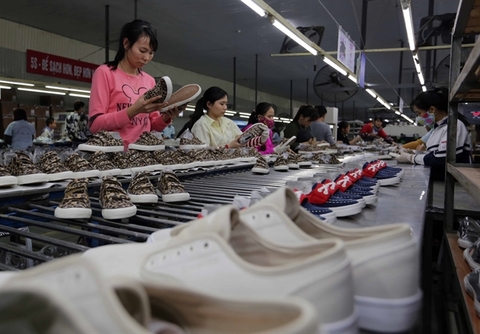
Footwear products were among goods which could benefit significantly from the Comprehensive and Progressive Trans-Pacific Partnership. — VNA Photo
Improving structural reforms and businesses’ competitiveness is critical to efficiently implement the Comprehensive and Progressive Trans-Pacific Partnership (CPTPP) in Viet Nam, heard a conference held by the Central Institute for Economic Management (CIEM) on Wednesday in Ha Noi.
The CIEM’s Director Tran Thi Hong Minh said the CPTPP, which took effect in early 2019, was expected to create new impetus for trade and investment development and boost economic reform in Viet Nam.
However, Minh said efficiency in implementing CPTPP and competence in taking advantage of opportunities provided by the trade deal was heavily dependent on institutional capacities, the competitiveness and domestic firms' ability to adapt.
According to Nguyen Anh Duong, head of the CIEM’s General Research Department, it was necessary for Viet Nam to handle several institution-related problems to efficiently implement the CPTPP, including fully understanding the trade deal, enhancing co-ordination among ministries and agencies and timely issueing legal documents.
Duong added that the trade deal provided signicant opportunities to businesses but firms must make more preparations to realise the opportunities. Firms were paying more attention to taxes and tariff liberalisation but must also fully understand origin rules, he said.
Duong said opportunities would come first from businesses’ efforts to change their thinking and improve their competitiveness, adding that room for businesses to take advantage of the trade deal remained large.
Vo Tri Thanh, Director of the Institute for Brand and Competitiveness Strategy, said that as the CPTPP would push structural reform, implementing the trade deal would follow the commitments then more importantly, go beyond commitments for efficiency.
Nguyen Thi Trang, Director of WTO and Integration Centre under the Viet Nam Chamber of Commerce and Industry, said the CPTPP set requirements and created pressure for structural reforms in Viet Nam.
Together with the European Union – Viet Nam Free Trade Agreement, Viet Nam had singificnat economic opportunities, Trang said, adding that it was critical to speed up institutional reforms.
Tariff incentives provided by the trade deals would provide opportunities to boost the development of the part-supply industry, Trang said.
Trade between Viet Nam and CPTPP members reached US$77.4 billion in 2019, a year-on-year rise of 3.9 per cent, statistics of the Ministry of Industry and Trade revealed. — VNS